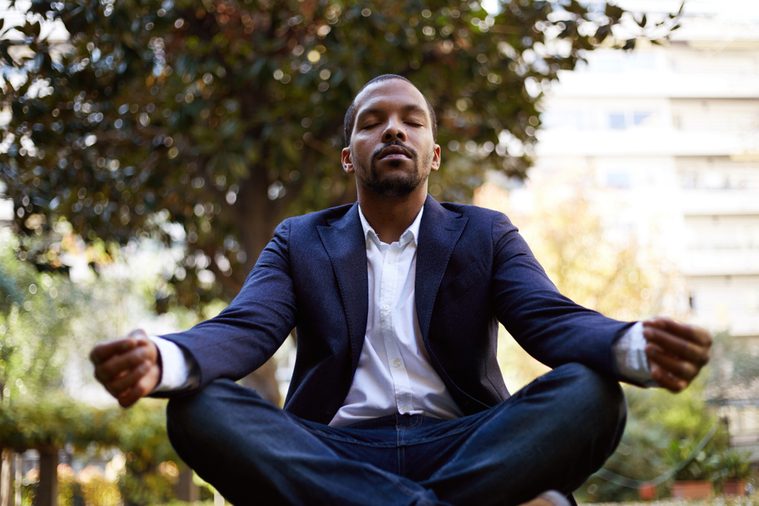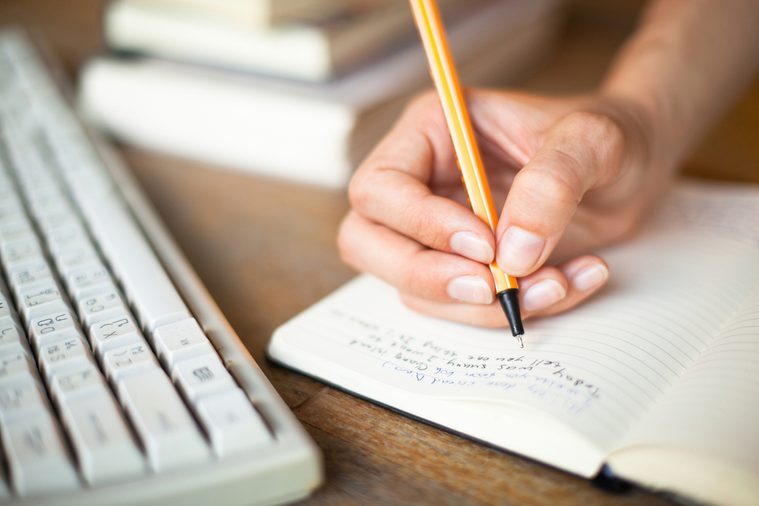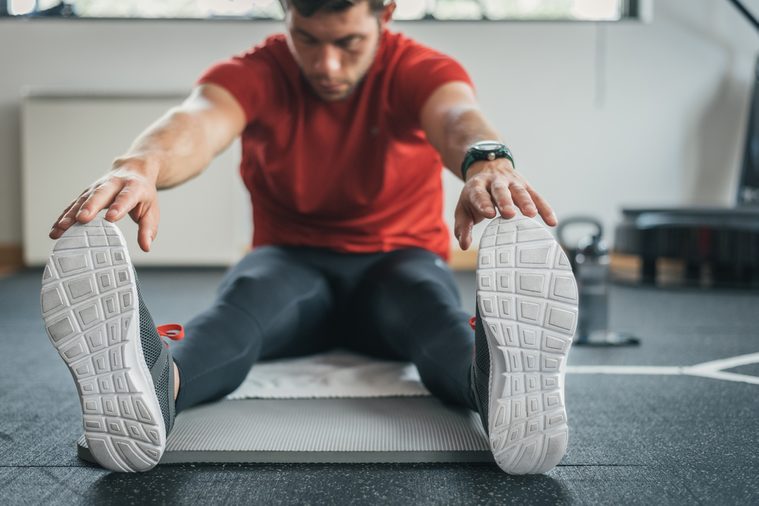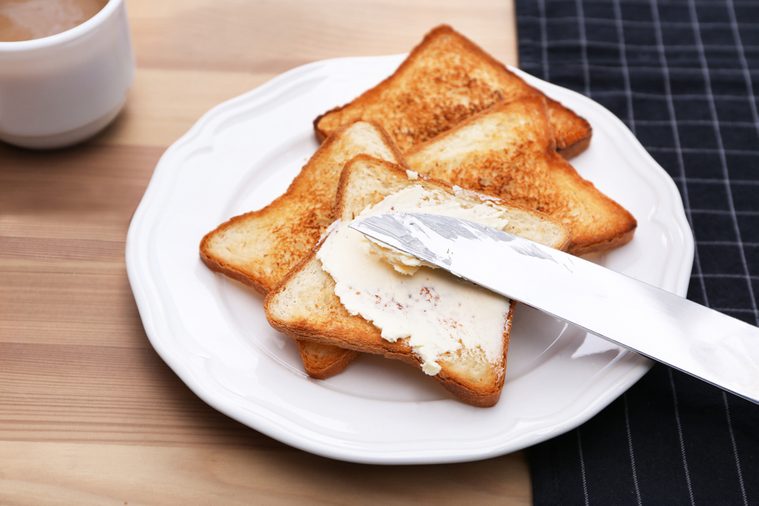
Stretch in bed
Try this even before you open your eyes. Lift one arm and begin by stretching each finger, then your hand, then your wrist, and then your whole arm. Move on to the other arm. Then stretch your toes, feet, ankles, and legs. Finally, end with a neck and back stretch that propels you out of bed. You’ve just limbered up your muscles and joints and enhanced blood flow throughout your body, providing a shot of oxygen to all your tissues. Take up the entire length of the bed when you stretch. According to Harvard University psychologist Amy Cuddy, this “power pose” mimics the position of a bold person, making you feel more confident all day long. Try these easy tricks to have a happy morning.

Open the blinds
When natural light from the sunrise creeps into your bedroom, it signals your brain to slow its melatonin production and boost cortisol, both of which tell your body to wake up. A flood of sunshine isn’t just an instant morning pick-me-up: A Northwestern University study found that people exposed to moderately bright light in the morning have a significantly lower body mass index than people who get the majority of their light exposure later in the day.

Take a breather
No matter when you do it, meditating has numerous benefits, such as fighting insomnia, reducing stress and anxiety, increasing energy levels, boosting your immune system, and providing mental clarity. Meditating in the morning helps you set a peaceful tone right off the bat so you are less likely to get sidetracked. If you’re a novice, an app such as OMG I Can Meditate! can get you started. (You’ll find it on YouTube as well.) OMG even has a wake‑up function that transitions your alarm right into a meditation session. This is one of a few morning brain exercises to keep your mind sharp.

Look back with rose-colored glasses
Research from San Francisco State University shows that focusing on good memories makes us feel more content with life. To start each day off right, take two minutes to write down every detail you can remember about a meaningful event from the day before, suggests Michelle Gielan, a positive psychology expert and the author of Broadcasting Happiness. “Yesterday’s high points can be today’s fuel for happiness,” she says. This can also have an effect on your overall health: A study found that patients suffering from chronic pain who did this for six months were able to reduce their intake of pain meds. These are the things that highly successful people do every morning.

Exercise a bit—on an empty stomach
Working out before you eat, researchers say, encourages your body to burn more fat for energy rather than relying on carbohydrates from food. In a Journal of Physiology study, participants who exercised after breakfast still gained weight (as did a control group who didn’t exercise), but those who exercised on an empty stomach did not. Moreover, research from the University of Vermont shows that the mood-enhancing benefits of a 20-minute workout can last for 12 hours, a boost you’ll want to enjoy all day long.

Don’t take a hot shower
Take a cold one. A growing body of research shows that enduring cold temperatures in the morning can lead to lower body fat, a stronger immune system, more energy, and even a higher overall tolerance to pain.

Don’t dress for success
Facebook’s Mark Zuckerberg is famous for his dressed-down style of jeans and a gray T-shirt. Zuckerberg explained to the Independent that he prefers to save his mental energy for important decisions rather than stressing about what to wear. While you may not be able to leave the house every day in jeans, you could simplify your wardrobe by color coordinating mix-and-match outfits. Also, follow these morning habits of highly organized people.

Wake your kids with a cuddle
Anyone who has ever raised children knows that few things are more stressful than waking up a slumbering child. Yet this is one of the few times a parent can catch a child still vulnerable. According to a 2016 University of Notre Dame study, children who get lots of affectionate touch grow up to be less anxious adults—and earlier studies showed that adults who get lots of hugs are better able to fight off colds and have lower blood pressure.

Turn on the music
Pick something energetic that you and others in the house enjoy and put it on while you get ready. If anyone plays an instrument, and if you have a little time, morning is the perfect time to practice, as it primes your brain for learning. One study from Johns Hopkins University found that both playing and listening to music help improve academic performance in 16 different ways, including increasing focus and memory.

Knock back a cold one
No, not beer—water. When you sleep, your body is deprived of water for eight or so hours, which can add to feeling drained or fatigued upon waking. “Drinking ice-cold water has been shown to provide a metabolism boost, as the body needs to warm the water to body temperature during digestion,” says Erin Palinski-Wade, RD, CDE, the author of 2 Day Diabetes Diet. Try these tips for waking up in the morning without a struggle.

And add lemon to it
Lemon in your water has myriad health benefits. Vitamin C, found in lemon and other citrus fruits, strengthens the immune system, protects against damaging free radicals, helps skin stay wrinkle-free, and may improve overall digestion. Plus, the acidity in lemon juice contributes to the acidic environment in the stomach, which “serves as a chemical barrier to deter pathogens from gaining a foothold and causing illness,” says Roxanne B. Sukol, MD, a preventive-medicine specialist at the Cleveland Clinic’s Wellness Institute.

Find a sweet spot
Everyone should be on the lookout for excess sugar. But a University of Barcelona study found that healthy men and women who drank a caffeinated beverage with sugar before breakfast had a longer attention span and better verbal memory recall than those who started their morning with either caffeine or sugar by itself.

Break your fast twice
Breakfast is the most important meal of the day, so why not have two? A study published in the journal Pediatric Obesity tracked the weight and breakfast-eating patterns of 584 students over two years. They found that frequent breakfast skippers showed increased odds of becoming overweight or obese compared with those who ate two breakfasts (one at home and one at school). The sensible takeaway: If you eat more in the morning, you’ll be less likely to snack at night, when it’s harder to burn off calories. Make sure to try these brain-boosting morning habits that might just make you a genius.

Don’t forget the protein
Of course, what you eat also matters. Research presented at a 2013 Obesity Society meeting found that women who ate a breakfast with more than 30 grams of protein (twice as much as most Americans get at breakfast) consumed 175 fewer calories at lunch compared with those who ate a breakfast with just 3 grams of protein. Eggs, plain Greek yogurt, and nuts are all quick, easy protein-rich ways to start your day.

Eat from the bottom up
It sounds strange, but if you want to lower your calorie intake, flip your buttered toast or salted potato rounds upside down. “When you eat foods this way,” Devin Alexander, a chef and former host of FitTV’s Healthy Decadence, told Health, “the flavor hits your tongue right away, and you taste more of it. Ultimately, that means you can cut out at least half the belly-bloating salt or butter.”

Savor some fun
Many people dread having to face a new day of work, school, or chores, says Steve Orma, PhD, a clinical psychologist and the author of Stop Worrying and Go to Sleep. But if the first thing you do is pleasant, you’ll find it much easier to get going. “This can be meditating, having a cup of coffee as you read your favorite blog, journaling, etc. Choose activities you enjoy and that set you on a good path for the day,” Orma says.

Seek out good news
In a 2015 study, researchers asked one group of participants to watch just three minutes of positive, solutions-focused news (such as a video of a 70-year-old man who got his GED after failing the test dozens of times). These participants were 27 percent more likely to report a few hours later that their day had been “happy” than people who watched negative news in the morning. Study author Gielan also cited substantial evidence that negative moods affect workplace performance.
Voilà! You’ve improved your state of mind, your health, and your productivity—all before the weekday has even begun. Now you’re ready to conquer your to-do list for today and every day. Next, read about how you should start your morning so that you have a stress-free and productive workday.